News - February 2017
21 December 2016 - Ireland rugby coach receives honorary degree from Ulster University
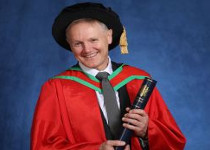
Josef ‘Joe’ Schmidt, the coach who led the Ireland rugby team to their first victory against the New Zealand All Blacks in 111 years, has been awarded an honorary degree by Ulster University for his distinguished services to sport.
With a renowned reputation as a leading university for sport on the island of Ireland, Ulster University conferred the Doctor of Science (DSc) on Joe during the Winter graduations held at the Millennium Forum, Derry.
The New Zealand-born rugby union coach and former teacher coached the New Zealand schoolboys during his teaching days before becoming full-time assistant coach at Bay of Plenty, Auckland Blues, Clermont Auvergne, and then head coach of Leinster. On the back of unprecedented success at Leinster, winning four trophies in three years, Joe was appointed Ireland head coach in 2013.
Image: Josef Schmidt
Source: Ulster University
Back to top
19 January 2017 - Ulster University to collaborate with Korea on innovative sustainable technology research

Ulster University has further strengthened its international research links after extending a Memorandum of Understanding (MoU) with Korea Conformity Laboratories.
Since 2008, Ulster University’s School of Built Environment has partnered with the leading testing and certification organisation in Korea, jointly securing over £1.5 million for pioneering research into fire safety engineering. The institutions have signed a further 10 year commitment to future collaboration on ground-breaking research into innovative sustainable technologies.
A delegation from Korea Conformity Laboratories travelled to Ulster University to sign the MoU and tour the first-class research facilities at the Centre for Sustainable Technologies.
Image: Pictured during a visit to Ulster University is President of Korea Conformity Laboratories, Kyungsik Kim, with Professor Neil Hewitt, Director of the Centre for Sustainable Technologies at Ulster University.
Source: Ulster University
Back to top
13 January 2017 - Ulster University showcases world-leading research transforming connected health sector
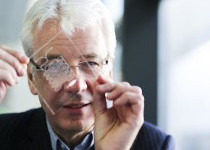
Leading technology companies have been given the opportunity to explore how Ulster University’s world-leading connected health research is transforming the sector and driving economic growth for Northern Ireland at the latest Internet of Things Alliance (IoTA) event.
Ulster University is at the forefront of connected health research delivering over 20 research projects with a value exceeding £10M in the last three years. Its multi-disciplinary research is positively impacting healthcare delivery across the globe with a focus on sensor technology for diagnostic and therapeutic applications.
Director of Ulster University’s Nanotechnology and Integrated BioEngineering Centre (NIBEC) and keynote speaker, Professor Jim McLaughlin, said: “We are focused on an Internet of Healthcare Things which will transform how we address the current healthcare crisis of managing chronic diseases facing an ageing population.
“In our labs we are developing small, low-cost devices that can analyse your blood, capture your heartbeat, talk to your phone and provide regular updates to a consultant in a hospital many miles away.”
Hosted at the NIBEC in partnership with the NI Connected Health Innovation Centre (CHIC), the IoTA event brought together industry and academia to discuss the opportunities in the sector. The IoTA is an industry-focused collaboration that aims to explore the potential of IoT technology.
Image: Professor Jim McLaughlin showcasing IoT connected health technology at Ulster University
Source: Ulster University
Back to top
6 January 2017 - New Ulster University pancreatic cancer research set to further revolutionise treatment options
Pancreatic cancer is the fourth most common cause of cancer-related deaths globally and has the worst survival statistics of the twenty-one most common forms of cancer, with only 3 per cent of patients surviving five or more years after their initial diagnosis. While other forms of cancer have seen survival rates improve significantly over the past four decades, the survival rate for pancreatic cancer has remained unchanged.
Last year, Ulster University scientists identified a new therapy that can selectively target pancreatic cancer tumours using microbubble technology combined with harmless sound waves. This novel combined therapy was found to spare healthy tissue and reduce the side effects of conventional treatment, as well as deliver improved reductions in the size of the most common pancreatic tumour known as Pancreatic Ductal Adenocarcinoma (PDAC).
Now, a new Ulster University study, in partnership with the University of Oxford and funded with £180,000 from the national charity Pancreatic Cancer Research Fund (PCRF), will investigate if the microbubble technology can provide a similar boost alongside traditional radiotherapy treatments.
Ulster University’s Professor John Callan said: “It is well known that oxygen levels in pancreatic tumours are extremely low and certain cancer treatments require a good supply of oxygen to be effective. Last year, we demonstrated that by combining our microbubble technology with ultrasound we can help deliver oxygen to pancreatic tumours and help improve oxygen levels in the tumour.
“This latest strand of research will look specifically at radiotherapy, a treatment used by almost half a million people undergoing cancer treatment annually. It is a very effective way of controlling symptoms but it is limited by poor oxygen supply. By examining our microbubble technology in combination with radiotherapy, we hope to improve its effect on pancreatic cancer. We are really grateful to PCRF for supporting this study which we hope can make a real difference to pancreatic cancer patients in the future.”
Mr Mark Taylor, the lead consultant Hepatobiliary and Pancreatic Surgeon in the Belfast Health and Social Care Trust and a collaborator on the project, said: “This is an exciting project that involves combining a new microbubble technology for pancreatic cancer with existing radiotherapy treatment. By improving tumour oxygen levels, it is hoped that the radiotherapy treatment will be more effective. It may also be possible to combine the radiotherapy treatment with other drugs delivered using the microbubble technology to further enhance the effect. With little progress made in survival rates over the last forty years, there is a real need for new treatments to combat this disease. We must stress, however, this is still in the research phase and it will be several years before the treatment is considered for use in humans.”
Maggie Blanks, CEO of Pancreatic Cancer Research Fund, said: “Because every penny of our funding is donated by supporters who know how devastating pancreatic cancer is, it’s our priority to fund the most innovative research that could offer significant benefits to patients. This project is a great example of that strategy and we look forward to hearing the results.”
Image: Ulster University's Professor John Callan
Back to top
5 January 2017- Ulster University wins landmark €23 million of EU cross-border funding for research and innovation

Ulster University has won €23 million of highly competitive European funding via the EU’s INTERREG VA programme, which will see the University lead three major UK and cross-border research projects.
The funding, awarded through the European Union's INTERREG VA Programme, which is managed by the Special EU Programmes Body (SEUPB), will enable Ulster University to advance its world-class research globally in personalised medicine, renewable energy and connected health technology. Partners include other UK and RoI institutions and companies with existing global expertise in each sector.
Ulster University’s Vice-Chancellor, Professor Paddy Nixon said: “These are strategically important research areas within which Ulster University is already renowned for its world class research. Winning this €23 million of INTERREG funding now further underpins our capability. It sends a strong message to the wider research community about our ability to deliver positive impact through research and highlights Ulster University’s broader ambition to transform lives and make a lasting contribution to global societies and communities.
“The funding will facilitate some of the most exciting and advanced research in personalised medicine currently being undertaken globally; research that will improve patient care and outcomes, develop patient monitoring technology that will improve heart disease care by enhancing sensor technology options and, boost collaboration and accelerate the commercialisation of advanced renewable technology solutions.
“The wider economic impact of this research funding cannot be underestimated. In addition to the €23 million of funding, the multiplier effect will generate a further secondary output impact of over €29 million in the UK, with approximately €19 million of this being in Northern Ireland.
“The funding will also support the creation of 24 PhD researcher posts across the three projects, enriching both the local economy in terms of salary contribution and the wider Northern Ireland research environment.”
Image: Ulster University has secured €23m Interreg funding for priority research
Source: Ulster University
Back to top
21 December 2016 - Ulster University seeks GMC accreditation for Medical School proposal

University has taken another step forward in its commitment to developing a medical school in the North West, by submitting an application for accreditation to the General Medical Council (GMC).
Ulster University’s medical school proposal, which includes a graduate entry focus, is currently being considered by the Department of Health. It aims to provide broader access to medical training and address the skills and workforce challenges faced by the health care sector, mainly in the North West, but also across Northern Ireland as a whole.
The GMC is the body responsible for accreditation and educational standards for all UK doctors through unevelopment, Ulster University said: “Doctors in Northern Ireland do an excellent job however we simply do not have enough of them. Working with our partners in the community, in health and social care trusts, in GP federations, and in the business sector, Ulster University’s medical school proposal will help to address a number of long term issues relating to population health and wellbeing.
“From the severe shortage of GP’s and the challenges of recruiting senior medical staff for hospitals in the North West and beyond, to the rising costs of locums and overtime, access to a new medical school will raise both the volume and quality of available knowledge and skills.
“The GMC accreditation process can be lengthy and it is important that we begin the process now so we can - subject to the necessary approvals along the way – be in a position to welcome the first intake of Ulster University medical students in 2019.
“With our longstanding history of world-leading medical and health related teaching and research in subjects including stratified medicine, allied health professionals, biomedical sciences and nursing, to pioneering new treatment options for conditions including diabetes, mental health, cancer and Alzheimer’s, a medical school is the natural next step for Ulster University.
“The major infrastructure and quality teaching we put in place in the North West will help to address the many health and wellbeing issues facing patients and communities across Northern Ireland for decades to come.”
Image: Professor Hugh McKenna, Dean of Medical School Development
Source: Ulster University
Back to top
16 December 2016 - Ulster University wins global Confucius Institute of the Year Award
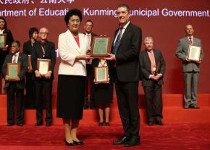
Competing against over 500 Confucius Institutes in 140 countries, Ulster University has won the Confucius Institute of the Year award, an international accolade that recognises the University’s commitment to furthering the teaching of Chinese language and culture in primary and secondary schools in Northern Ireland.
Opened in 2012, Ulster University’s Confucius Institute aims to develop academic, cultural, economic and social ties with China. It supports the teaching of Chinese in over 100 schools across Northern Ireland, as well as the education of Chinese culture through community liaison initiatives and events.
The accolade was awarded by Hanban, a public institution affiliated with the Chinese Ministry of Education.
Ulster University’s Pro-Vice-Chancellor for Global Engagement, Professor Ian Montgomery received the award from Vice-Premier of China Madam Liu Yandong at the 11th Global Confucius Conference held in Kunming, capital of Southwest China's Yunnan province.
Professor Montgomery said: "This international accolade is an extremely positive endorsement of Ulster University's Confucius institute and a much deserved acknowledgment of our talented, committed staff to supporting exceptional growth in the number of Chinese language learners in Northern Ireland, which has risen from 101 in 2012 to over 18,000 in October 2016.
"Ulster University’s Confucius Institute plays a key role in supporting our vision to build a globally engaged and globally relevant University. It offers valuable opportunities for increased cooperation between the people of Northern Ireland and China, creating mutually beneficial and prosperous partnerships in education, culture, science, technology and business."
Image: Ulster University's Professor Ian Montgomery receives the Confucius Institute of the Year Award from Vice-Premier of China Madam Liu Yandong.
Source: Ulster University
Back to top
6 December 2016 - Ulster University and Irish FA to create island of Ireland’s first football coaching degree

Ulster University and the Irish Football Association (IFA) have announced plans to create the island of Ireland’s first ever football coaching degree, which will inspire and shape the next generation of leaders within the multi-billion pound football industry.
With plans to start in September 2017, Ulster University’s BSc Hons Football Coaching and Business Management will be delivered on a part-time basis at the National Football Stadium at Windsor Park. The innovative degree will allow students to combine theory and practice with the completion of professional UEFA coaching qualifications along with an undergraduate degree.
Image: Pictured (l-r) are Irish FA Chief Executive, Patrick Nelson; Ulster University Executive Dean, Professor Carol Curran; Ulster University Chancellor, Dr James Nesbitt; and Irish FA Chairman, Gerry Mallon at the National Football Stadium, Windsor Park.
Source: Ulster University
Back to top
1 December 2016 - On Course for success
 Ulster University’s LLM Clinical Legal Education (CLE) programme was recognised by a panel of expert judges as the ‘Postgraduate Law Course of the Year’ at the recent gradireland Higher Education Awards and Symposium.
Ulster University’s LLM Clinical Legal Education (CLE) programme was recognised by a panel of expert judges as the ‘Postgraduate Law Course of the Year’ at the recent gradireland Higher Education Awards and Symposium.
The LLM CLE course is unique in the UK and Ireland. Rooted in Ulster University’s Law Clinic, the programme gives students – under close staff supervision – the opportunity to provide social security and employment law advice to clients who are unable to access legal support elsewhere. It capitalises on partnership working with key stakeholders across the legal sector and since 2013, external sponsorship has been secured to provide student scholarships. The Department of Justice created the full-fees ‘Access to Justice’ award in recognition of the LLM’s contribution to developing access to justice; and Allen & Overy has also contributed a £50,000 scholarship package across three years to support students in promoting and protecting access to justice in the community.
Professor Gráinne McKeever, Reader in Law and Director, Ulster University Law Clinic, said: “The LLM CLE has been running for four years now and has been recognised both nationally and internationally as an innovative model for the provision of advice/representation to the public on social security and employment law. To date, 28 LLM students have provided over 2,000 recorded hours of free legal activity on 87 closed cases.
“This pioneering course has been designed and delivered by academics with real-world experience and has a strong emphasis on building the practical skills that employers are looking for, linking world-leading research with innovative education. The focus on career development is intrinsic to the learning, training and assessment that the LLM provides and has led to a consistent record of graduates securing relevant work and career opportunities, with graduate records showing a 100% employment rate.
“The gradireland recognition represents a notable achievement for staff, students and the wide range of external partners across the legal sector who have generously enabled our postgraduates to access expertise which has transformed their learning experience.”
The achievement rounds off a successful year for the Law Clinic. In April the Clinic was highly-commended at the UK LawWorks & Attorney General Student Awards, in the main category of ‘best contribution by a Law School’, acknowledging the outstanding pro bono work carried out by Ulster University law students.
Image: Professor Gráinne McKeever
Source: School of Law
Back to top
11 November 2016 - Inaugural Research Communication Awards
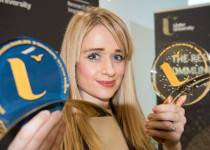
The Department of Research & Impact has initiated a new award scheme and competition for early career researchers, celebrating those who have shown exceptional skill in communicating the purpose, meaning and impact of their research.
Tim Brundle, Director of Research & Innovation, explained: “Sustaining interdisciplinary research progress at Ulster University depends on training and developing the next generation of researchers. As part of our ongoing commitment to supporting the career development of researchers, these inaugural Research Communication Awards were conceived and designed as a result of feedback from members of the Early Career Researcher Forum who identified skills gaps in how to engage with the promotion of their research.
"Academics across our campuses and faculties are undertaking world-leading research, but often find it a challenge to translate their complex work into clear communication messages for both specialist and non-specialist audiences. Through this interactive programme we have aimed to showcase best practice and explore the most innovative techniques for communicating to lay people, policy makers and potential funders.”
The training programme took the form of workshops run by Bespoke Communications and included a mix of practical activities and interactive content aimed at teaching researchers how to develop relatable communications targeted at the general public, presenting to an audience, presenting to a camera and presenting ideas clearly. At the end of the training, participants were tasked with developing a 90-second video on their research, which was then judged by an independent panel across four sector categories – Social Renewal; Sustainability; Healthy Communities; and Creativity and Culture. An overall winner was also identified as having delivered the best video presentation.
Winners were:
Winner, Healthy Communities and Early Career Researcher: Dr Claire McCauley, Research Associate, School of Nursing and graduate of PhD in Life and Health Sciences and MSc Health Promotion and Population Health 2012, Jordastown
Winner, Social Renewal: Dr Christina Sevdali, Lecturer, School of Communication
Winner Creativity & Culture: Dr Victoria McCollum, Lecturer in Cinematic Arts, School of Creative Arts & Technologies and graduate of PhD in Arts 2015 and BA Hons Media Arts 2007, Coleraine
Winner Sustainability: John Bustard, PhD student, Department of Hospitality, Tourism and Management and graduate of MSc Sport Management 2014, Jordanstown
A special award of research communication champion went to Alan Hook for his support and assistance throughout the process and filming of the researchers.
Dr Claire McCauley, overall winner, said: “As an early career researcher currently exploring the impact of individual specific reminiscence for people living with dementia and their carers, this programme was very worthwhile for me. It was great to meet colleagues at the same stage of their career, share ideas and experiences and explore the potential for interdisciplinary working.
“Communicating effectively in academia and disseminating research findings to the communities in which we live, can influence public or political understanding of pertinent health issues, policy change and, crucially, provides a reliable information and knowledge base as the foundation of a healthy community! So I hope that my participation on the programme enables me to improve my skills, build a trusted reputation, communicate more effectively about my research, help me secure more funding and most of all, enhance my engagement with the public to improve the quality and impact of my work.”
Image: Dr Claire McCauley, with her awards designed by Cara Murphy, lecturer in silversmithing
Source: Ulster University
Back to top
4 October 2016 - Core Systems and Ulster University collaborate to transform prisoner rehabilitation worldwide
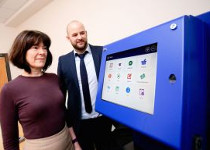 Core Systems, global experts in prisoner self-service technology solutions, has accessed expertise from Ulster University to further develop its latest software product, which is improving prisoner rehabilitation and streamlining criminal justice systems across the globe.<
Core Systems, global experts in prisoner self-service technology solutions, has accessed expertise from Ulster University to further develop its latest software product, which is improving prisoner rehabilitation and streamlining criminal justice systems across the globe.<
Part-funded by an Invest Northern Ireland Innovation Voucher, Core Systems enlisted support from experts at Ulster University’s state-of-the-art UX Lab to better understand how prisoners interact with its Direct2inmate software platform. Ulster University’s UX Lab works with industry to enhance usability of digital products to increase user efficiency and satisfaction.
Core Systems, global experts in prisoner self-service technology solutions, has accessed expertise from Ulster University to further develop its latest software product, which is improving prisoner rehabilitation and streamlining criminal justice systems across the globe.
Image: Patricia O'Hagan, Chief Executive Officer of Core Systems and Dr Raymond Bond, lead researcher from Ulster University’s UX Lab.
Source: Ulster University
Back to top